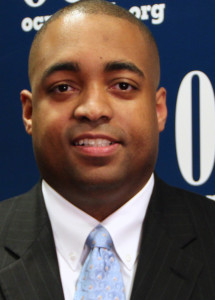Are Oklahoma tax hikes and spending increases inevitable?

GOVERNMENT GROWTH: Jonathan Small, the fiscal policy analyst the Oklahoma Council of Public Affairs, points to at least nine “revenue enhancements” in the Sooner State since 2009.
By Patrick B. McGuigan | Oklahoma Watchdog
OKLAHOMA CITY — The historian Odie B. Faulk, during an evening class in my years at Oklahoma State University, uttered words that stuck with me through the past four decades: “Nothing is inevitable. Nothing — not the rise and fall of great nations; not the dawning of another day.”
The latter part of the comment appealed to my spiritual side, my belief there is an order to the universe, that a benevolent and just one governs, and that we are subject to that order regardless of wealth, intelligence, or any other attribute.
The first part of the comment appealed to my rational side. What we call history flows from the decisions of actors on the stage … of history. Some are deeply depraved. Others are, as a Baptist preacher friend of mine said years ago, “so heavenly minded that they are no earthly good.”
Most of us fall somewhere in between, including those who fight over government spending, and the tax burden most appropriate in a free society.
My parents grew up as Democrats. Daddy admired Franklin D. Roosevelt; Momma was a Harry Truman acolyte. They both loved Dwight D. Eisenhower and John F. Kennedy.
Each later became conservatives in belief and practice. Except for Ronald Reagan, their evolution wasn’t because of modern Republican leaders, but because they paid attention.
As a lad growing up in a union Democrat family, I concluded the government of my country was too large, too intrusive and too abusive of the productive classes to be of true service. That government did not and does not well serve rich or poor, able-bodied or disabled, the faithful or those without faith.
As years passed, I fused that belief into those wise words from the old historian about the way things happen. Nothing is inevitable, yet every year, the governments of this nation and state confiscate more and more of the peoples’ resources, delivering less and less of real value in return.
Public policies evolve and develop based on the actions and reactions of real human beings, not plaster saints or stone monuments or inevitable social forces.
Nothing is inevitable except death and judgment, but a lot of people believe ever-rising taxes are not only inevitable but essential to the health of society and government — and the course of history.
In 2012, Oklahoma Gov. Mary Fallin wrote, in the foreword to a policy book for the American Legislative Exchange Council, “Based on the success we have enjoyed enacting pro-growth policies like those championed by ALEC, our state is moving forward with a bold tax reform plan that will represent the most significant tax cut in state history and chart a course toward the gradual elimination of the state income tax.”
Nothing materialized. An epic fail was prelude to a year of status quo.
Andrew Spiropoulos, a professor at my dad’s alma mater, Oklahoma City University, reflects that too many Republicans “seem to have been uninformed that conservative legislators are expected to cut taxes and spending.”
They have raised taxes and spent record amounts of money in what is deemed among the reddest of the red states.
Jonathan Small, vice president for policy at the Oklahoma Council of Public Affairs, has pegged at least nine “revenue enhancements” enacted since 2009.
Best-known is the hospital provider tax. OCPA analysts wrote last year, “Oklahomans were promised in 2011 that the hospital provider tax — a gimmick used to game the federal government for more money to prop up the dysfunctional Medicaid program — would be temporary. But policymakers, many of them violating a no-new-taxes promise they made to their constituents, extended the tax (in 2013).”
Further, Oklahoma taxpayers likely won’t see the tax relief they had been promised would begin Jan. 1, 2015. The only tax-relief proposals receiving consideration at the Capitol wouldn’t kick in until 2016, and even those proposals have triggers that could further delay relief.
Some policymakers are in fact ready to raise taxes again. For example:
- The oil and gas horizontal drilling tax rate may lapse next year and return to its rate from decades ago.
- A state Senate committee advanced two separate tax proposals that would, through the elimination of certain deductions, increase the personal income-tax burden for some taxpayers. Fortunately, it appears those proposals are dead now, replaced by actual tax cuts — which, however, won’t take effect for two years.
- Bureaucrats and special interests that benefit from the millions of dollars in state excise taxes on traditional tobacco products are maneuvering to increase taxes on e-cigarettes and “vaping” products. These products aren’t considered tobacco products and are assessed the normal (and much lower) 4.5 percent state sales tax.
Considered in isolation, any one increase in taxes can be rationalized. Taken together — in the absence of broad reform to the state’s taxing structure — they document a distressing pattern.
These choices seem to make no sense, given that total tax collections and total state spending in Oklahoma are both at an all-time high.
Small pointed to a review of the Oklahoma Tax Commission’s “Daily Report of Taxes Collected” on Jan. 31 showing the state was on pace to set yet another record for tax collections this fiscal year.
Spiropoulos said our political leaders “must sign on to a tax cut that, without gimmicks or triggers, reduces the highest rate to less than 5 percent.” The top rate is 5.25 percent.
It would be a good thing for those in power to keep promises made. It would be nice if they kept them now, instead of waiting two years.
Contact Patrick McGuigan at pmcguigan@watchdog.org .
The post Are Oklahoma tax hikes and spending increases inevitable? appeared first on Watchdog.org.







